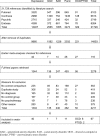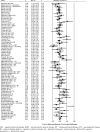The efficacy of psychotherapy and pharmacotherapy in treating depressive and anxiety disorders: a meta-analysis of direct comparisons - PubMed (original) (raw)
The efficacy of psychotherapy and pharmacotherapy in treating depressive and anxiety disorders: a meta-analysis of direct comparisons
Pim Cuijpers et al. World Psychiatry. 2013 Jun.
Abstract
Although psychotherapy and antidepressant medication are efficacious in the treatment of depressive and anxiety disorders, it is not known whether they are equally efficacious for all types of disorders, and whether all types of psychotherapy and antidepressants are equally efficacious for each disorder. We conducted a meta-analysis of studies in which psychotherapy and antidepressant medication were directly compared in the treatment of depressive and anxiety disorders. Systematic searches in bibliographical databases resulted in 67 randomized trials, including 5,993 patients that met inclusion criteria, 40 studies focusing on depressive disorders and 27 focusing on anxiety disorders. The overall effect size indicating the difference between psychotherapy and pharmacotherapy after treatment in all disorders was g=0.02 (95% CI: -0.07 to 0.10), which was not statistically significant. Pharmacotherapy was significantly more efficacious than psychotherapy in dysthymia (g=0.30), and psychotherapy was significantly more efficacious than pharmacotherapy in obsessive-compulsive disorder (g=0.64). Furthermore, pharmacotherapy was significantly more efficacious than non-directive counseling (g=0.33), and psychotherapy was significantly more efficacious than pharmacotherapy with tricyclic antidepressants (g=0.21). These results remained significant when we controlled for other characteristics of the studies in multivariate meta-regression analysis, except for the differential effects in dysthymia, which were no longer statistically significant.
Copyright © 2013 World Psychiatric Association.
Figures
Figure 1
Selection and inclusion of studies
Figure 2
Differential effects of psychotherapy and pharmacotherapy (Hedges' g)
Similar articles
- Adding psychotherapy to antidepressant medication in depression and anxiety disorders: a meta-analysis.
Cuijpers P, Sijbrandij M, Koole SL, Andersson G, Beekman AT, Reynolds CF 3rd. Cuijpers P, et al. World Psychiatry. 2014 Feb;13(1):56-67. doi: 10.1002/wps.20089. World Psychiatry. 2014. PMID: 24497254 Free PMC article. - Comparative effectiveness of continuation and maintenance treatments for persistent depressive disorder in adults.
Machmutow K, Meister R, Jansen A, Kriston L, Watzke B, Härter MC, Liebherz S. Machmutow K, et al. Cochrane Database Syst Rev. 2019 May 20;5(5):CD012855. doi: 10.1002/14651858.CD012855.pub2. Cochrane Database Syst Rev. 2019. PMID: 31106850 Free PMC article. - Treatment efficacy and effectiveness in adults with major depressive disorder and childhood trauma history: a systematic review and meta-analysis.
Childhood Trauma Meta-Analysis Study Group. Childhood Trauma Meta-Analysis Study Group. Lancet Psychiatry. 2022 Nov;9(11):860-873. doi: 10.1016/S2215-0366(22)00227-9. Epub 2022 Sep 22. Lancet Psychiatry. 2022. PMID: 36156242 - Antidepressants for people with epilepsy and depression.
Maguire MJ, Weston J, Singh J, Marson AG. Maguire MJ, et al. Cochrane Database Syst Rev. 2014 Dec 3;2014(12):CD010682. doi: 10.1002/14651858.CD010682.pub2. Cochrane Database Syst Rev. 2014. PMID: 25464360 Free PMC article. Updated. Review.
Cited by
- Mediators and theories of change in psychotherapy with adolescents: a systematic review protocol.
Taubner S, Saliba A, Heinonen E, Protić S, Volkert J, Adler A, Barkauskiene R, Conejo Cerón S, Di Giacomo D, Ioannou Y, Mestre JM, Moreno-Peral P, Mucha Vieira F, Mota CP, Raleva M, Rangel Santos Henriques MI, Røssberg JI, Schmidt SJ, Stepišnik Perdih T, Ulberg R, Sales CMD. Taubner S, et al. BMJ Open. 2021 Mar 5;11(3):e042411. doi: 10.1136/bmjopen-2020-042411. BMJ Open. 2021. PMID: 33674369 Free PMC article. - Efficacy, Safety, and Evaluation Criteria of mHealth Interventions for Depression: Systematic Review.
Duarte-Díaz A, Perestelo-Pérez L, Gelabert E, Robles N, Pérez-Navarro A, Vidal-Alaball J, Solà-Morales O, Sales Masnou A, Carrion C. Duarte-Díaz A, et al. JMIR Ment Health. 2023 Sep 27;10:e46877. doi: 10.2196/46877. JMIR Ment Health. 2023. PMID: 37756042 Free PMC article. Review. - Comparative Efficacy and Acceptability of Pharmacological, Psychotherapeutic, and Combination Treatments in Adults With Posttraumatic Stress Disorder: A Network Meta-analysis.
Merz J, Schwarzer G, Gerger H. Merz J, et al. JAMA Psychiatry. 2019 Sep 1;76(9):904-913. doi: 10.1001/jamapsychiatry.2019.0951. JAMA Psychiatry. 2019. PMID: 31188399 Free PMC article. - Efficacy and cost-effectiveness of a blended cognitive behavioral therapy for depression in Spanish primary health care: study protocol for a randomised non-inferiority trial.
Vara MD, Herrero R, Etchemendy E, Espinoza M, Baños RM, García-Palacios A, Lera G, Folch B, Palop-Larrea V, Vázquez P, Franco-Martín M, Kleiboer A, Riper H, Botella C. Vara MD, et al. BMC Psychiatry. 2018 Mar 23;18(1):74. doi: 10.1186/s12888-018-1638-6. BMC Psychiatry. 2018. PMID: 29566656 Free PMC article. - Does concurrent medication usage affect patient response to internet-delivered cognitive behaviour therapy for depression and anxiety?
Edmonds M, McCall H, Dear BF, Titov N, Hadjistavropoulos HD. Edmonds M, et al. Internet Interv. 2019 Dec 29;19:100302. doi: 10.1016/j.invent.2019.100302. eCollection 2020 Mar. Internet Interv. 2019. PMID: 32071886 Free PMC article.
References
- Kessler RC, Berglund P, Demler O, et al. National Comorbidity Survey Replication. The epidemiology of major depressive disorder: results from the National Comorbidity Survey Replication (NCS-R) JAMA. 2003;289:3095–105. - PubMed
- Kessler RC, Berglund P, Demler O, et al. Lifetime prevalence and age-of-onset distributions of DSM-IV disorders in the National Comorbidity Survey Replication. Arch Gen Psychiatry. 2005;62:593–602. - PubMed
- Berto P, D'Ilario D, Ruffo P, et al. Depression: cost-of-illness studies in the international literature: a review. J Ment Health Policy Econ. 2000;3:3–10. - PubMed
- Greenberg PE, Birnbaum HG. The economic burden of depression in the US: societal and patient perspectives. Exp Opin Pharmacother. 2005;6:369–76. - PubMed
LinkOut - more resources
Full Text Sources
Other Literature Sources
Miscellaneous

